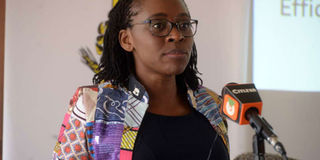Limited funding derailing women run businesses

What you need to know:
- Need for innovative financial products for women
- 48 per cent of micro, small and medium-sized enterprises (MSMEs) in Kenya owned by women
- Financial obstacles twice as common among women-led firms than men
There is need for innovative financial products to fund women start-ups in manufacturing sector, Kenya Association of Manufacturers(KAM) chief has urged.
KAM Chief Executive Officer Ms Phyllis Wakiaga, said access to finance remains a limiting factor to women’s participation in the industry.
“Limited funding is a major challenge facing women in the industry and women are likely to be denied loans because of gender and cultural biases,” said while responding to Nation’s queries on obstacles afflicting women in the industry.
According to Kenya National Bureau of Statistics (KNBS) women own 48 per cent of all the micro, small and medium-sized enterprises (MSMEs) in Kenya, and which contribute about 20 per cent to the GDP.
Despite their potential, women-owned businesses in Kenya are less likely to grow due such constraints as finances as cited in the 2019 Promoting SME Competitiveness in Kenya Targeted Solutions for Inclusive Growth report by the International Trade Centre (ITC), a joint agency of the World Trade Organization and the United Nations.
Appropriate technology
The report notes that “Financial obstacles are twice as common among women-led firms with 30 per cent of enterprises headed by women calling access to financial institutions a severe obstacle to their current operations, compared with just 16 per cent of men-led firms.”
Women manufacturers are also unable to adopt appropriate technology and innovation necessary to enhance production due to inaccessibility to appropriate business development services, she said.
“Additionally, the absence of specialised professional and technical support to women-owned manufacturing enterprises and programmes that do not match global trends for training women entrepreneurs deter consistent and sustainable growth,” she said.
Despite women being identified as key pillars of achieving Africa’s Agenda 2063, which envisions prosperity and zero poverty, African governments are yet to find solutions to constraints prohibiting their progress, access to finance and market key being key.
Financial barriers
A 2017 Graça Machel Trust survey that sampled more than 600 female entrepreneurs from Kenya, Rwanda, Tanzania and Uganda, in interrogating financial and non-financial barriers to their growth, ranked access to finance and market as the leading hindrances.
If the women were given a chance to seek a loan to boost their business in the next three years (from 2017), those in Kenya, Uganda and Rwanda would require between US$ 10,000 (Sh1 million) and US$ 30, 000 (Sh3 million), the report shows.
Their counterparts in Tanzania would seek an amount ranging from US$ 30,000 to US$ 60,000 (Sh6 million).





